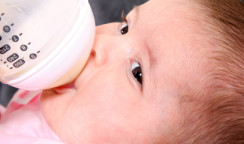Babies born healthier since smoking ban in cafes and restaurants: report
 Fewer babies with a low birth weight are being born since the introduction of the smoking ban in restaurants and cafes in July 2008.
Fewer babies with a low birth weight are being born since the introduction of the smoking ban in restaurants and cafes in July 2008.
There are also fewer extremely premature births, researchers at the Erasmus medical centre say in an article in the magazine Scientific Reports published on Friday.
The researchers looked at birth rates between 2000 and 2011, concentrating on two specific moments: the introduction of the smoke-free workplace in January 2004 and the ban on smoking in restaurants and cafes of July 2008.
‘We looked at the data of around two million births,’ research chief Jasper Been told the AD. ‘We saw no important changes following the smoking ban at work places, but after the ban was introduced in restaurants and cafes, we saw a definite reduction in the number of children born with a low birth weight. That reduction was around 4% to 5%.’
Other factors
Been told the AD the smoking ban is the most likely cause of the reduction. ‘We took other factors into account, such as the age and background of the mothers, but the ban is the most likely reason,’ he said. ‘The fact is that the reduction began from the moment the ban was introduced.’
Been and his team also found that the number of babies being born very prematurely dropped. There was also a drop in the number of mothers who smoked during their pregnancy and in the number of people smoking at home.
‘It shows that these bans not only have an effect in the place where they are introduced, but also on the general behaviour of people,’ according to Been.
Thank you for donating to DutchNews.nl.
We could not provide the Dutch News service, and keep it free of charge, without the generous support of our readers. Your donations allow us to report on issues you tell us matter, and provide you with a summary of the most important Dutch news each day.
Make a donation